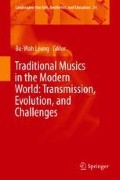Abstract
The place of traditional music in the field of music education has been a topic of discussion for some decades. Recently the discussion has been revived due to the dominance of popular contemporary music in the lives of students. However, most students have little knowledge about ethnic music of the past and how it has contributed to shaping their individual ethnicity, culture and unique sound. In the chapter that follows, important factors concerning traditional music and justification for its inclusion in the school music program and in music education will be explored. In particular, the chapter will focus on music from the African American culture in the United States. First, it reflects on the view of traditional African American music in music education programs and comments on the struggle to justify its worth as an art form. Second, it provides a historical perspective on the evolution of African American music in the United States. This includes a discussion on the connection to African music in relation to parallel traits present in the music and similar philosophical beliefs on teaching and learning. Third, it chronicles the evolution of African American music styles and their function within the culture. Last, it speaks to the relevance of an education in African American music for students, teachers, parents and the members of the community.
Access this chapter
Tax calculation will be finalised at checkout
Purchases are for personal use only
References
Adzinyah, A., Dumisani, M., & Tucker, J. (1986). Let your voice be heard. Dansbury: World Music Press.
Anderson, W., Campbell, P., & Moore, M. (2010). Multicultural Perspectives in Music Education (Vol. 1). Lanham: Rowman & Littlefield.
Baker, D. (2018). Style sheets on African Music. Washington: Thelonious Monk Institute of Jazz.
Brooks, T. (1984). America’s black musical heritage. Englewood Cliffs: Prentice Hall.
Courlander, H. (1966). Negro folk Music, U.S.A. New York: Columbia University Press.
Dvorak, A. (1893). Real values of Negro melodies. New York: New York Herald.
Floyd, S. (1995). The power of black music: Interpreting its history from Africa to the United States. New York: Oxford University Press.
Francis, D. (2008). The powerful role of music in society. London: Performing Rights Society for New Music.
Gbolonyo, K. (2010). African traditional musical concepts: Philosophical and pedagogical lessons for multicultural music education. Lanham: Rowman and Littlefield.
Hudson, W. (1995). How sweet the sound. New York: Scholastic, Inc.
Langer, S. (1948). Philosophy in a new key. New York: New American Library.
Levine, L. (1977). Black culture and black consciousness. Oxford: Oxford University Press.
Maultsby, P. (2005). Africanism in African American music. Bloomington: Indiana University Press.
Moore, M. (2009a). A case for multiculturalism in the general music classroom. In Musical dimensions. Melbourne: Australian Scholarly Publishing.
Moore, M. (2009b). Creation to performance: The journey of an African American community Gospel-Jazz ensemble. Lanham: Rowman and Littlefield Press.
Moore, M. (2010). African American music: Multicultural perspectives in music education. Lanham: Rowman and Littlefield Press.
Nketia, J. H. (1974). The music of Africa. New York: W.W. Norton and Company, Inc.
Rose, T. (1994). Black noise: Rap music and black culture in contemporary America. London: Wesleyan University Press.
Southern, E. (1971). The music of black Americans. New York: W.W. Norton and Company.
Wilson, O. (1983). Black music as an art form. Columbia: Center for Black Music Research.
Work, J. (1940). American Negro songs and spirituals. New York: Bonanza Books.
Author information
Authors and Affiliations
Editor information
Editors and Affiliations
Rights and permissions
Copyright information
© 2018 Springer International Publishing AG, part of Springer Nature
About this chapter
Cite this chapter
Moore, M.C. (2018). Reflections on Traditional African American Music: Its Function and Relevance in Contemporary Music Education. In: Leung, BW. (eds) Traditional Musics in the Modern World: Transmission, Evolution, and Challenges. Landscapes: the Arts, Aesthetics, and Education, vol 24. Springer, Cham. https://doi.org/10.1007/978-3-319-91599-9_2
Download citation
DOI: https://doi.org/10.1007/978-3-319-91599-9_2
Published:
Publisher Name: Springer, Cham
Print ISBN: 978-3-319-91598-2
Online ISBN: 978-3-319-91599-9
eBook Packages: EducationEducation (R0)

